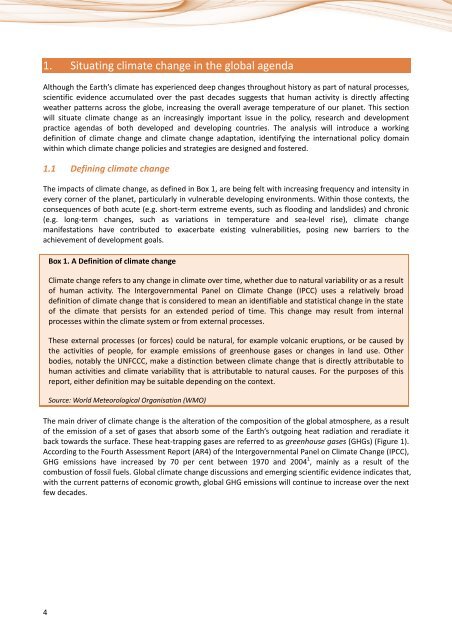Information and communication technologies (ICTs) and ... - ITU
Information and communication technologies (ICTs) and ... - ITU
Information and communication technologies (ICTs) and ... - ITU
You also want an ePaper? Increase the reach of your titles
YUMPU automatically turns print PDFs into web optimized ePapers that Google loves.
1. Situating climate change in the global agenda<br />
Although the Earth’s climate has experienced deep changes throughout history as part of natural processes,<br />
scientific evidence accumulated over the past decades suggests that human activity is directly affecting<br />
weather patterns across the globe, increasing the overall average temperature of our planet. This section<br />
will situate climate change as an increasingly important issue in the policy, research <strong>and</strong> development<br />
practice agendas of both developed <strong>and</strong> developing countries. The analysis will introduce a working<br />
definition of climate change <strong>and</strong> climate change adaptation, identifying the international policy domain<br />
within which climate change policies <strong>and</strong> strategies are designed <strong>and</strong> fostered.<br />
1.1 Defining climate change<br />
The impacts of climate change, as defined in Box 1, are being felt with increasing frequency <strong>and</strong> intensity in<br />
every corner of the planet, particularly in vulnerable developing environments. Within those contexts, the<br />
consequences of both acute (e.g. short-term extreme events, such as flooding <strong>and</strong> l<strong>and</strong>slides) <strong>and</strong> chronic<br />
(e.g. long-term changes, such as variations in temperature <strong>and</strong> sea-level rise), climate change<br />
manifestations have contributed to exacerbate existing vulnerabilities, posing new barriers to the<br />
achievement of development goals.<br />
Box 1. A Definition of climate change<br />
Climate change refers to any change in climate over time, whether due to natural variability or as a result<br />
of human activity. The Intergovernmental Panel on Climate Change (IPCC) uses a relatively broad<br />
definition of climate change that is considered to mean an identifiable <strong>and</strong> statistical change in the state<br />
of the climate that persists for an extended period of time. This change may result from internal<br />
processes within the climate system or from external processes.<br />
These external processes (or forces) could be natural, for example volcanic eruptions, or be caused by<br />
the activities of people, for example emissions of greenhouse gases or changes in l<strong>and</strong> use. Other<br />
bodies, notably the UNFCCC, make a distinction between climate change that is directly attributable to<br />
human activities <strong>and</strong> climate variability that is attributable to natural causes. For the purposes of this<br />
report, either definition may be suitable depending on the context.<br />
Source: World Meteorological Organisation (WMO)<br />
The main driver of climate change is the alteration of the composition of the global atmosphere, as a result<br />
of the emission of a set of gases that absorb some of the Earth’s outgoing heat radiation <strong>and</strong> reradiate it<br />
back towards the surface. These heat-trapping gases are referred to as greenhouse gases (GHGs) (Figure 1).<br />
According to the Fourth Assessment Report (AR4) of the Intergovernmental Panel on Climate Change (IPCC),<br />
GHG emissions have increased by 70 per cent between 1970 <strong>and</strong> 2004 1 , mainly as a result of the<br />
combustion of fossil fuels. Global climate change discussions <strong>and</strong> emerging scientific evidence indicates that,<br />
with the current patterns of economic growth, global GHG emissions will continue to increase over the next<br />
few decades.<br />
4

















